AMD has new Genoa-based Threadripper Pro and Threadripper series processors. The AMD Ryzen Threadripper Pro 7000WX line now scales up to 96 cores and the Threadripper 7000 series revives the high-end desktop line for the series. While we have the launch today, system availability is mostly going to be at least a few weeks off. We still have a few hands-on screenshots with the new chips.
AMD Ryzen Threadripper Pro 7000WX at 96 Cores and Threadripper 7000 HEDT
Since we know most folks will want to see the SKUs and pricing, here is the table that AMD shared.
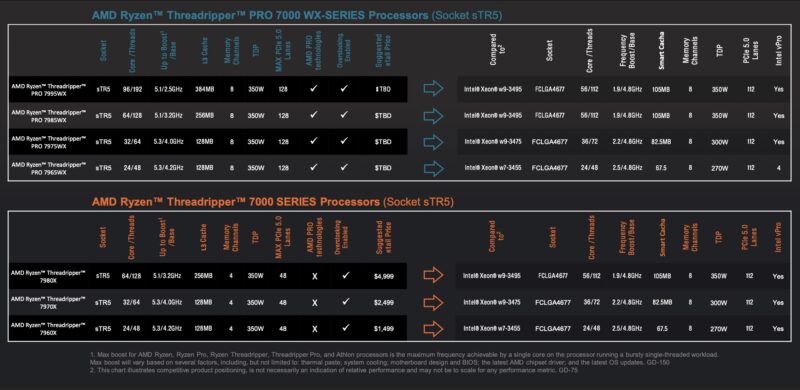
We do not have the AMD Ryzen Threadripper Pro 7000WX series pricing, but a 64-core Threadripper 7000 is $4999. Next, we are going to discuss the SKUs and differences.
AMD Ryzen Threadripper Pro 7000WX
The AMD Ryzen Threadripper Pro 7000WX is a fairly simple value proposition. AMD is bringing the Zen 4 AMD EPYC Genoa CPU line into the workstation market by adding a chipset and a few tweaks to the setup.
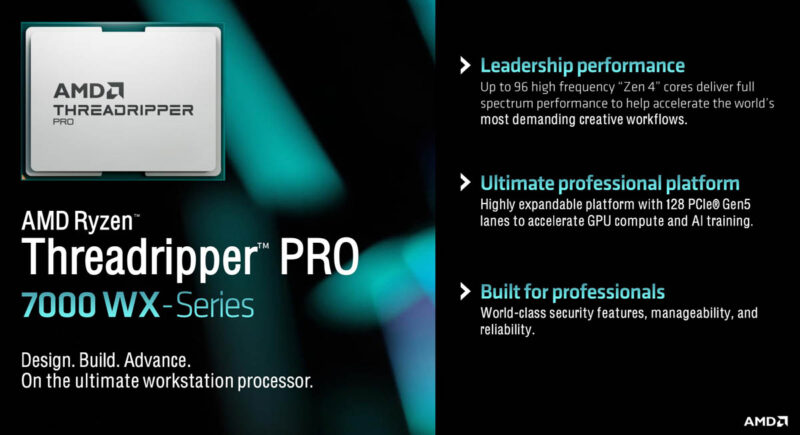
If you want to learn more about it, see our AMD EPYC Genoa launch piece.
Here is a screenshot we took of CPU-Z on the AMD Ryzen Threadripper Pro 7995WX 96 core part on Dell’s AMD Storm Peak platform. That is 96 cores and 192 threads.
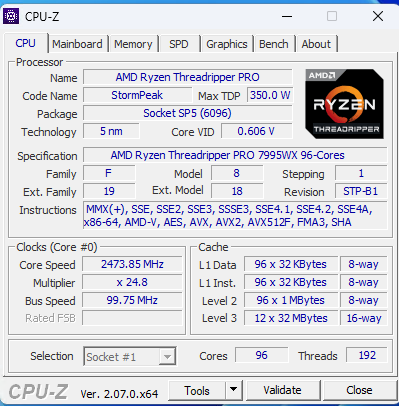
We grabbed this using a Dell Precision 7875 workstation which hopefully we get to do a full review of since it looks really interesting. Dell is using ducting like in a server to stay on air cooling in this generation. For those who are longtime readers, yes, the DIMMs are vertical while the airflow is horizontal through the chassis, but the ducting is apparently very good.
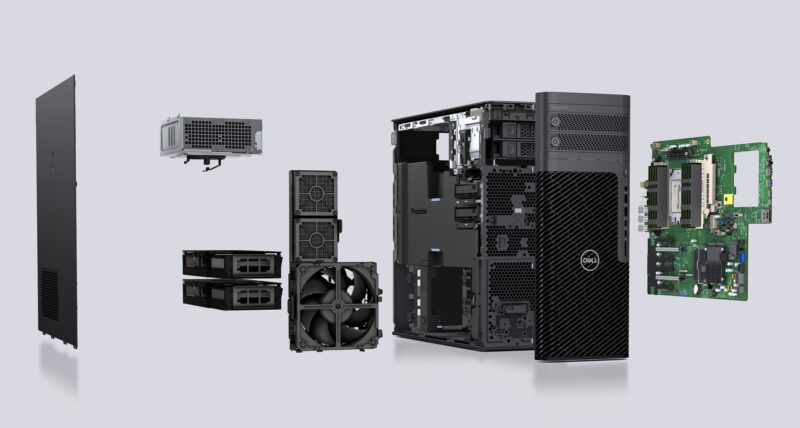
As one would imagine, more cores, more better.
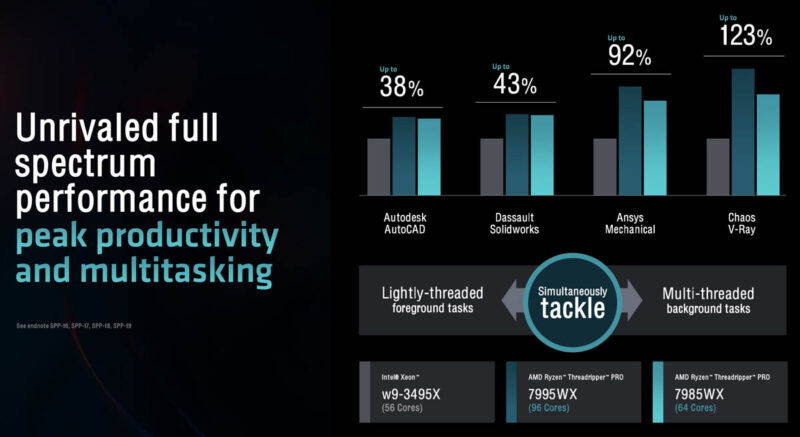
At STH, Genoa is basically old news at this point since we are three launches ahead on the EPYC side already (Genoa-X, Bergamo, and Siena), however, there are a few changes for the workstation part. An example is DDR5-5200 support versus DDR5-4800 support on the server side. The platforms themselves, however, only support 8-channel memory, not the full 12-channel.
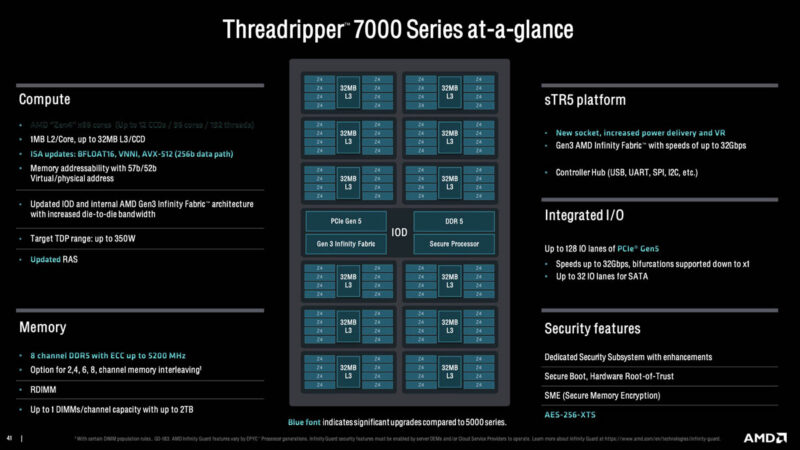
The other big change is the WRX90 chipset. Workstations have so much lower-speed I/O for things like USB connectivity and lower-speed networking, that AMD dedicates a PCIe Gen4 x4 link to the WRX90 chipset to put features like lower-speed USB and SATA. This frees up the PCIe Gen5 lanes for higher-speed devices.
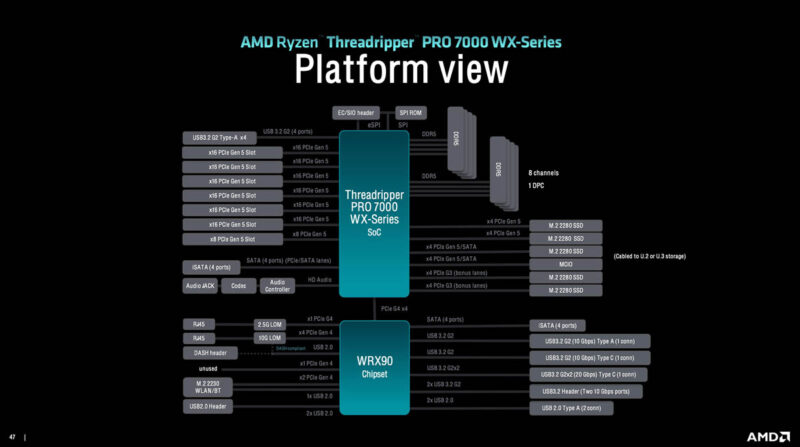
Here is the generational comparison between the AMD Ryzen Threadripper Pro 5000 Series and the 7000 series which is very similar to AMD EPYC Milan and AMD EPYC Genoa.
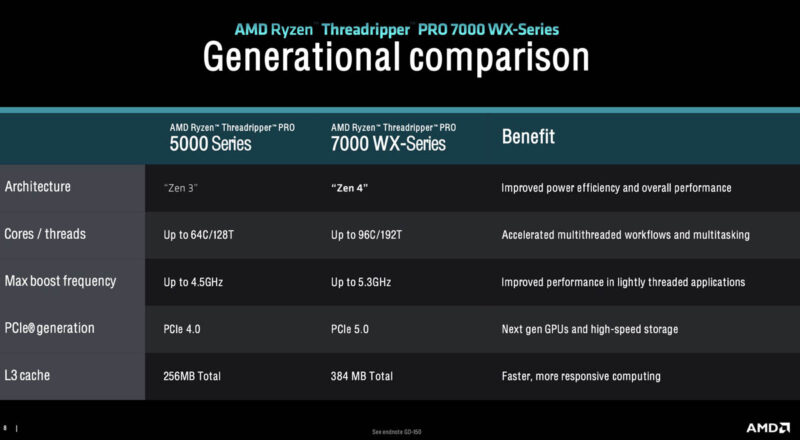
AMD rightfully compares this to the Intel Xeon W-3400 series where the top-bin side has a massive core count gap.
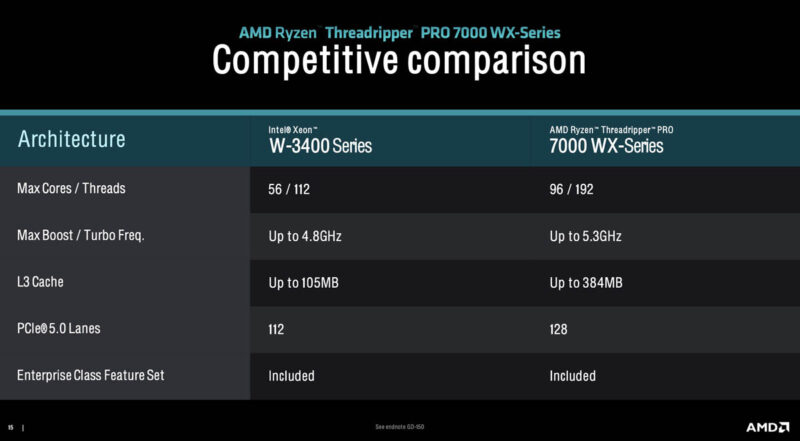
For those wondering, this is what the AMD Ryzen Threadripper Pro 7995WX’s Windows Task Manager looks like with 192 threads.
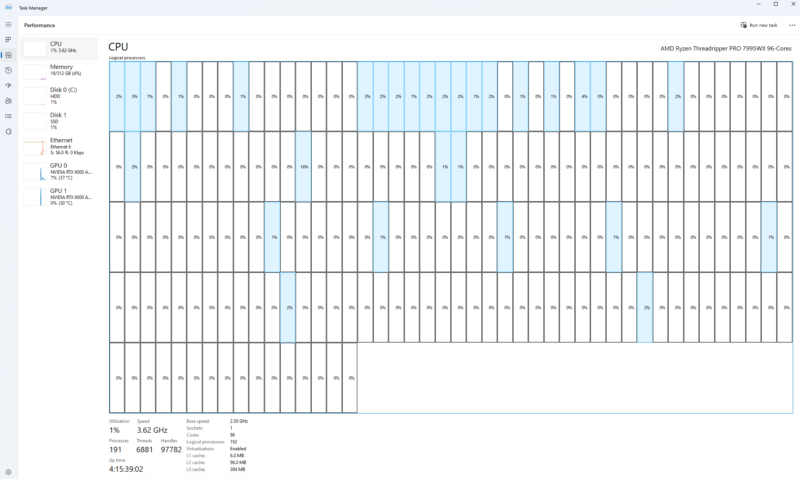
One item to point out however is that workstations are strange. Since they tend to be single-user systems, single-threaded workloads tend to be more impactful. Here was an example of two threads of 192 being occupied for around 1% CPU utilization. This really visualizes the challenge that AMD has in turning 96 core Genoa parts into workstation parts as this is far from ideal to have 99% of a CPU idle.
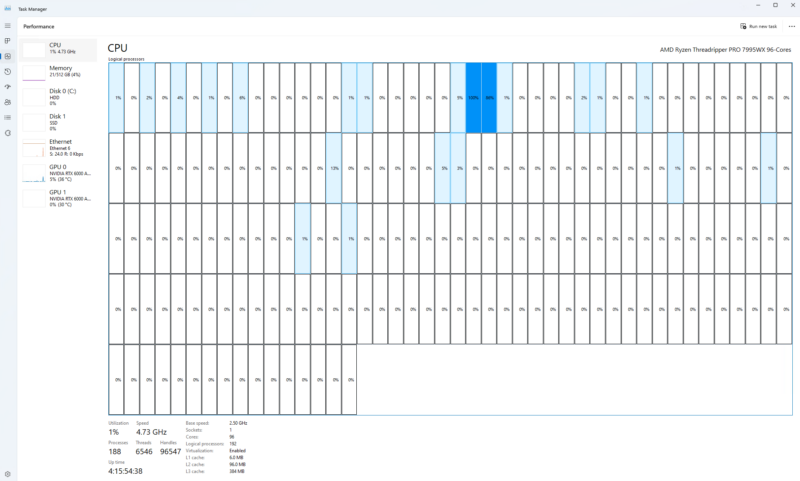
We ran the Dell Precision 7875 through a number of applications like Cinebench R23. This was better than the Intel Xeon w9-3495X, but as we noted in our Building 3x Intel Xeon W-3400 Workstation and Servers piece, 100K is possible on Intel’s 56-core part if you are willing to pay the power for it AND do not have an OEM system from a company like Dell or Lenovo.
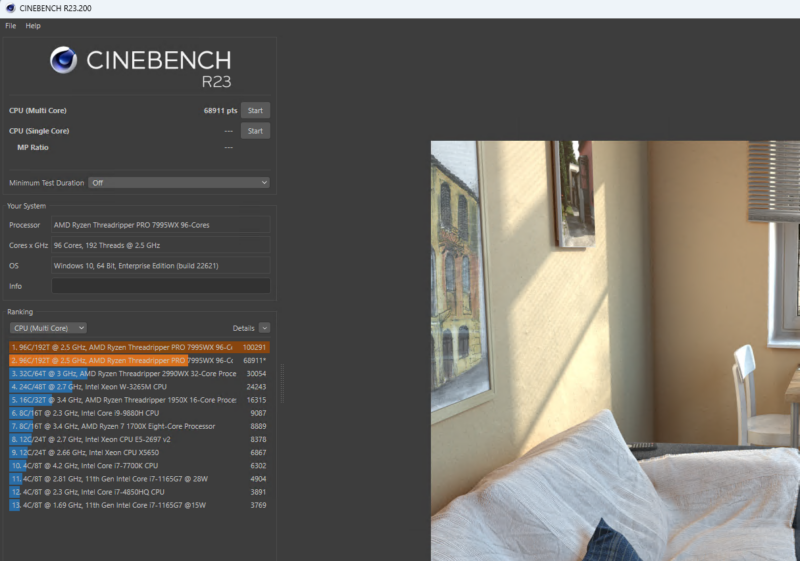
Update: We thought the 65-70K looked low, but given this was remote testing, there was only so much we could troubleshoot when that is what we got consistently. Instead, here is another run of over 100K.
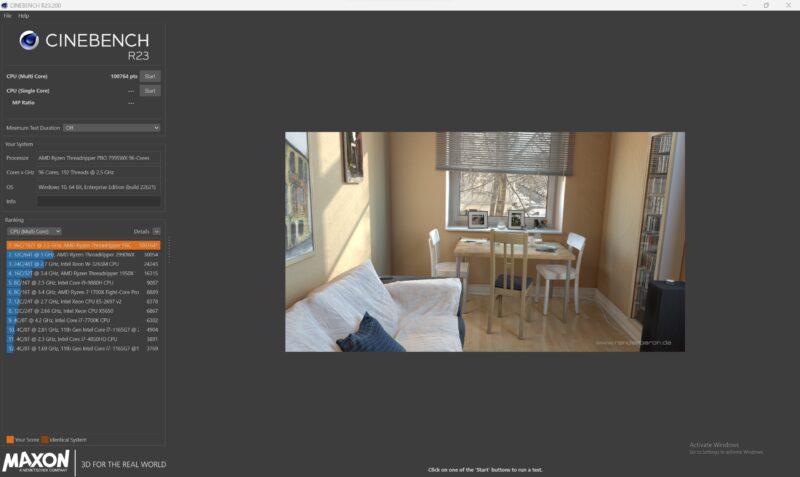
For some context, that still feels lower than the Threadripper Pro 7995WX should be capable of given the 56-core Xeon W can get to this level on an extremely high power budget and AMD Zen cores do well on Cinebench, but Dell said that is about right for its Precision 7875. Our guess is that companies like Falcon Northwest, Boxx, Pugest Systems, and others will have systems 40%+ faster than this when they start tuning systems with these chips, but Dell has a big customer base and is more conservative.
Here is the Cinebench R24 multi-core speed.
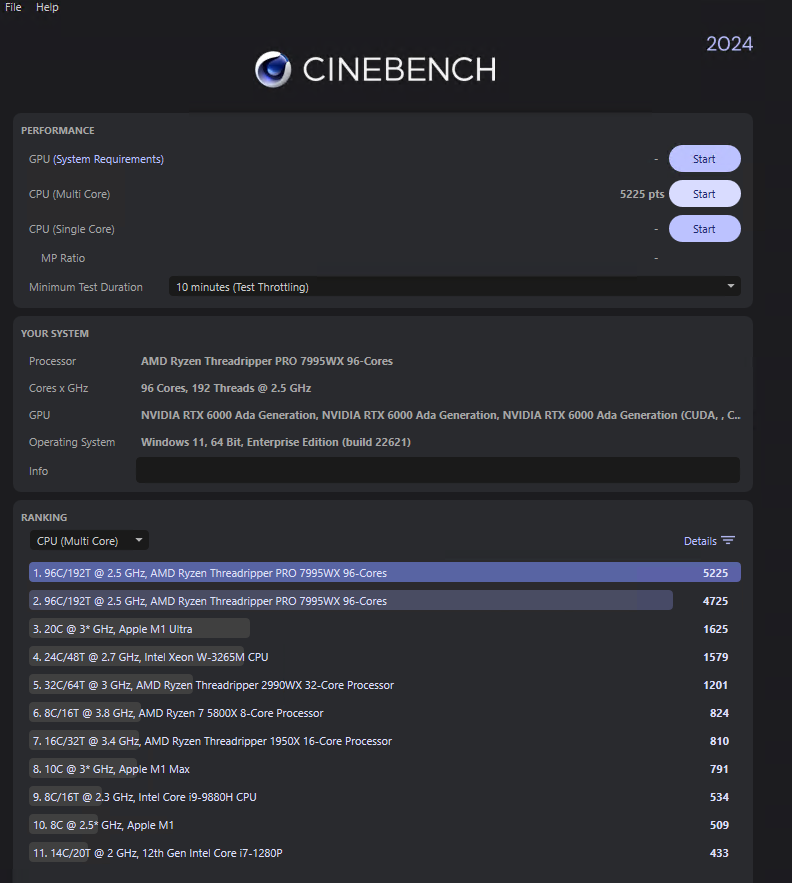
Here is what we got on the single to multi-ratio.
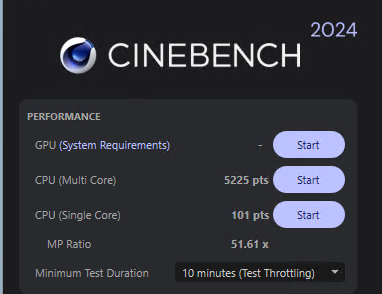
We have a number of other numbers, but we only had remote access so it is hard to review a workstation remotely. If you want to see more on the NVIDIA RTX 6000 Ada, we have lots on that.
AMD, however, has a number of performance claims on the new parts. There is a common theme if you are skimming, AMD says it is faster than Intel.
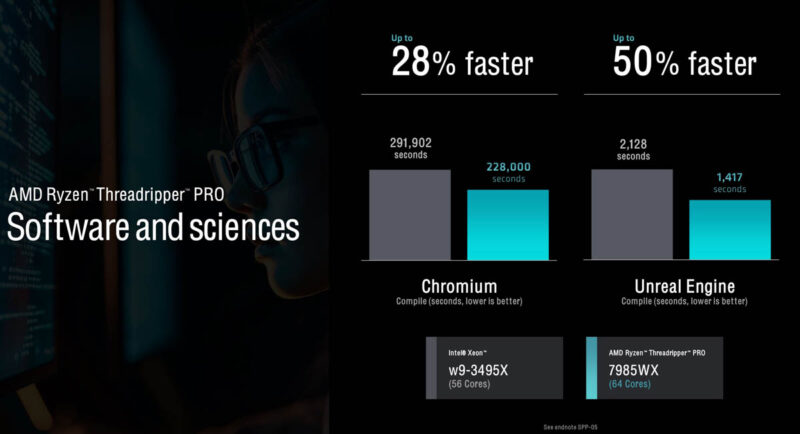
It also went down into the stack to 32 cores / 36 cores which was great to see. 96 cores to 56 cores would not be an interesting comparison especially in realms of per-core licensing.
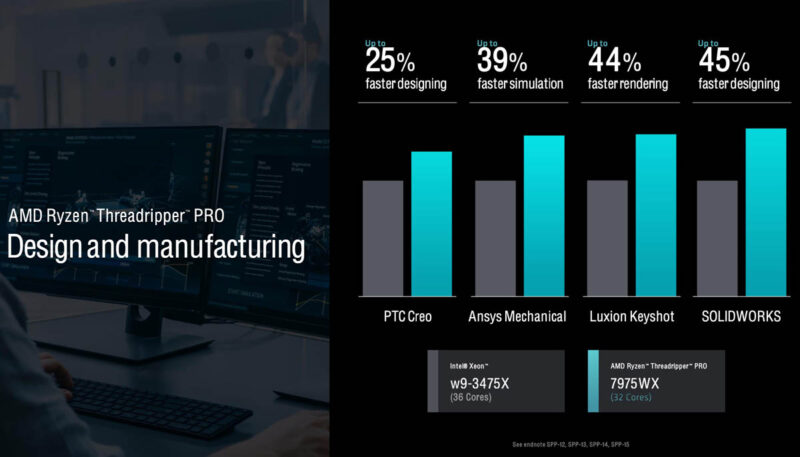
Here is the media and entertainment at 56 vs 96 cores:
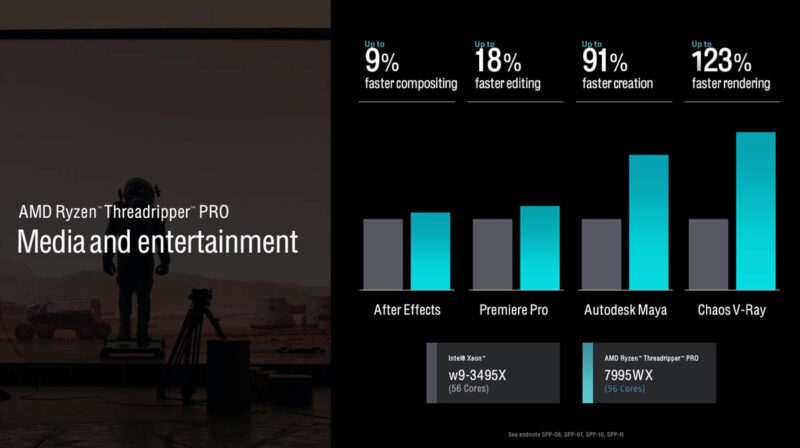
Architecture, engineering, and construction is 36 and 32 cores again:
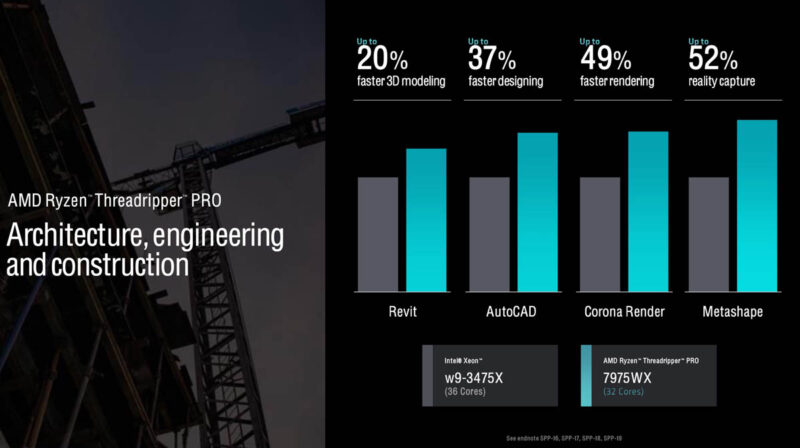
AMD says it has a number of partners. There are a few conspicuously absent from this slide including ASUS. We reviewed the ASUS Pro WS WRX80E-SAGE SE WiFi Review AMD TR Pro years ago for the Threadripper Pro 3995WX and 5995WX series.
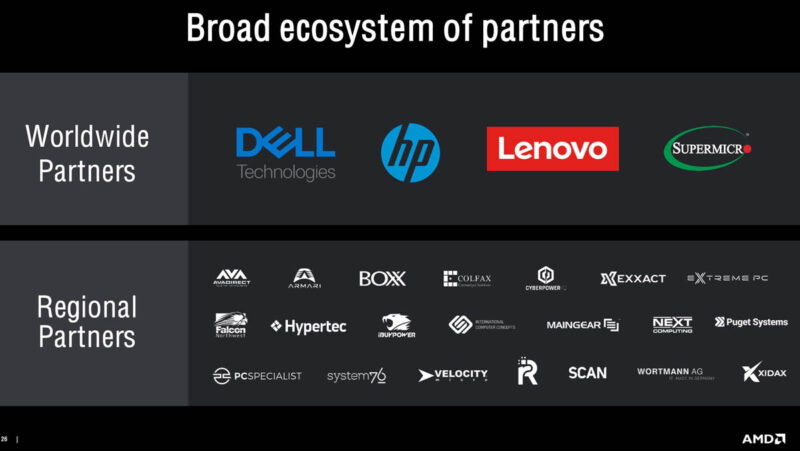
Here are the optimizations and certifications for Threadripper Pro. It is at least a bit funny that Adobe After Effects is the first entry here with “certified” and “optimized”, yet AMD shows only a 9% performance lead in the 56 core Xeon to 96 core Threadripper Pro on that workload. It probably would not have made our highlight slide if we had a workload we said was 9% faster using 71% more cores and that was an “optimized” case.
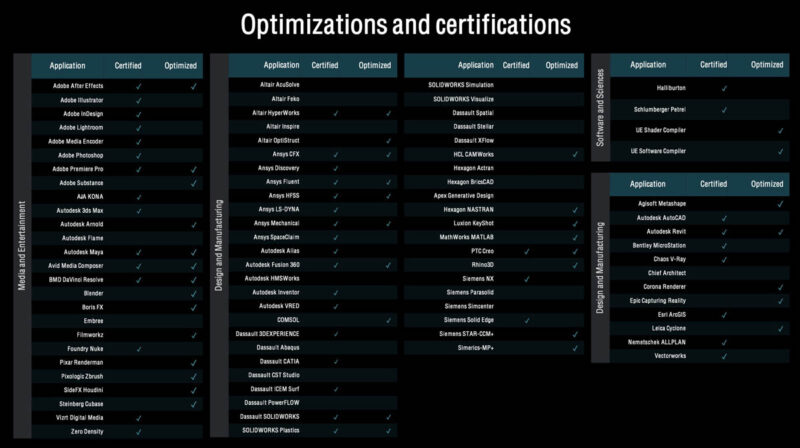
Let us be clear, from our hands-on remote testing, the AMD Ryzen Threadripper 7995WX is a beastly CPU and one folks should rightly salivate over.
One small item to remember with the Xeon W-3400 series is the platform makes an enormous difference. AMD was apparently using a BOXX platform for most of its benchmarking, but depending on how you set your power levels, the Xeon w9-3495X can either be VERY fast or slow. Many folks do not talk about this, but here is the Lenovo, Supermicro, a self-built ASUS (default power), and Falcon Northwest base overclocked systems with the w9-3495X. Suffice it to say in workstations, there is a significant performance gap between OEMs.
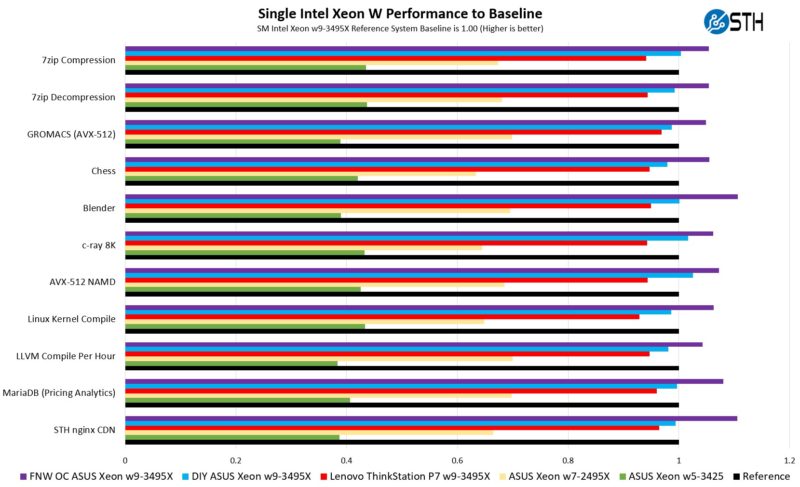
We saw the same thing when we did the Lenovo vs. Supermicro Threadripper Pro 5995WX systems as well.
At the same time, AMD has another CPU, the high-end desktop (HEDT) version the Threadripper 7000 series.
AMD Ryzen Threadripper 7000
The AMD Ryzen Threadripper 7000 series only has 4-channel memory and has fewer PCIe lanes using the TRX50 chipset. If you want, you can use the Threadripper Pro parts with the lower-end TRX50 platforms.
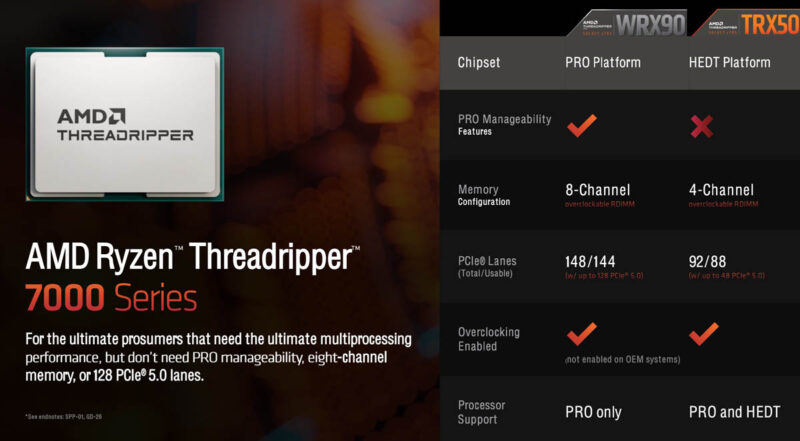
Here we have the three SKUs, the AMD Ryzen Threadripper 7980X, 7970X, and 7960X that scale from 24 to 64 cores.
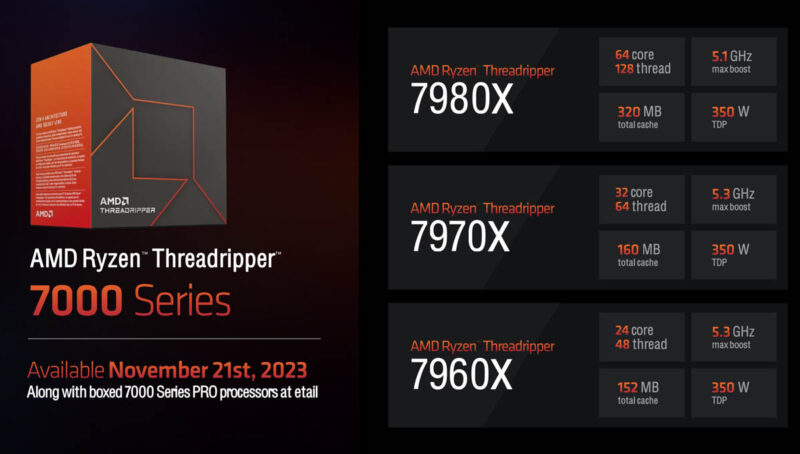
AMD says the new parts are fast, as we would expect from a marketing slide.
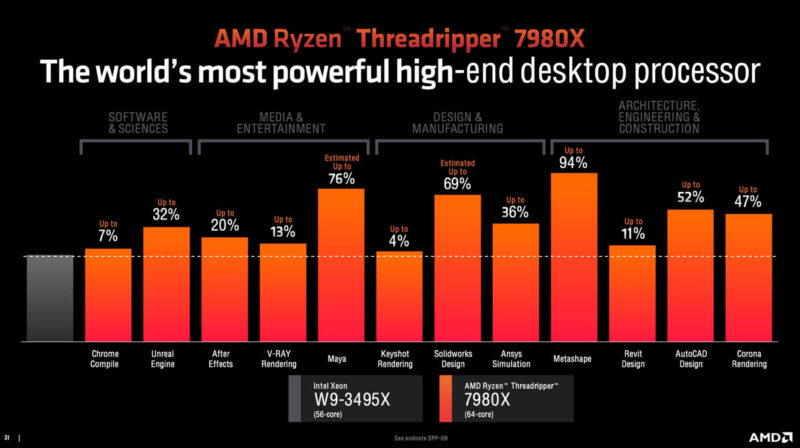
Here is the platform comparison between the two platforms.
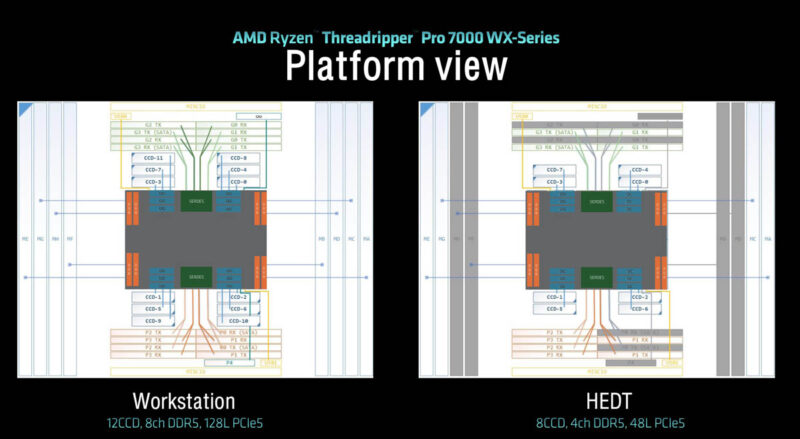
One of the key items here is that Threadripper (non-Pro) needs to get ECC RDIMM support in this generation. If you saw our Why DDR5 is Absolutely Necessary in Modern Servers piece or the video, we outlined that unlike in DDR4, DDR5 UDIMMs/ RDIMMs are not pin compatible.
Both the 8 channel Threadripper Pro WRX90 and 4 channel Threadripper TRX50 platforms support overclocking DDR5 memory. If you saw our recent V-Color 256GB 8x 32GB DDR5-6400 RDIMM Kit Mini-Review or Kingston Fury Renegade Pro 16GB DDR5-6000 ECC RDIMM Mini-Review you can see that vendors are now making overclockable DDR5 ECC RDIMM kits for platforms like these and the Xeon W-3400 / W-2400 series.
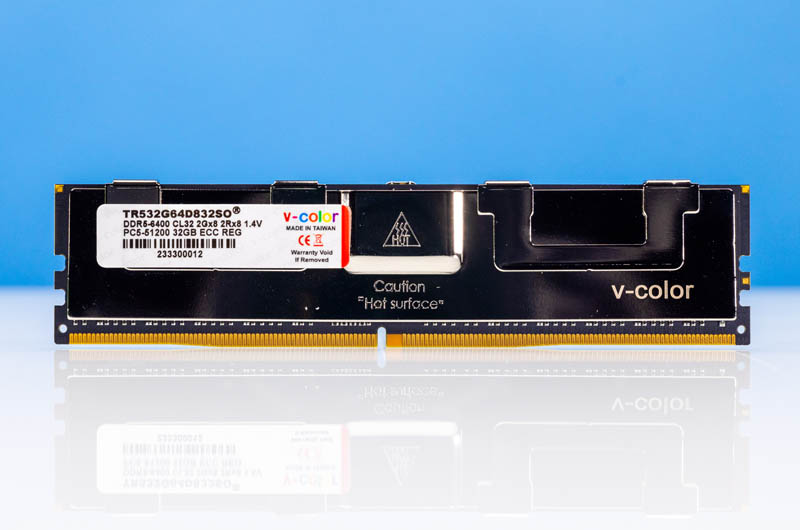
It is an exciting development for the HEDT space.
Final Words
The new parts are very exciting, and absolute monsters of platforms. Over the past few years I have been using professional workstations as my main rigs. One died in the scramble to move STH to Scottsdale and I let Carey Holzman, a new AZ neighbor, fix it live. He got it working in part 2.
Something I learned along the way is that the server-based ECC platforms from Intel and AMD are awesome. While many folks will focus solely on the performance of the 96-core parts, that is shortsighted. For licensing reasons, many customers want fewer higher-performance cores. AMD has done a great job and we regularly saw clock speeds in excess of 4.5GHz on the 96-core part, but there are going to be a number of folks more excited for the Zen 4-based 32 and 64-core parts than one might expect by reading 96-core headlines.
Overall though, these will be expensive platforms to use, but ones that I know a lot of our readers will enjoy.

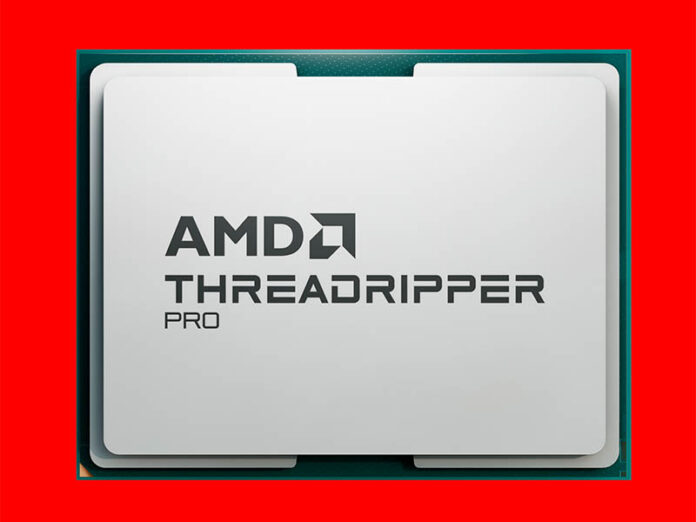
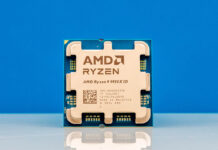
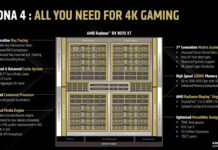
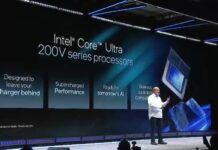
Dell aren’t liquid cooling? It’s 2023.
Only 48 lanes out of 128 is a bit sad
Well, PCIe lanes _are_ stupid. Why would anyone want many?
Could you check if the 5ccd sku is using GMI3-WIDE?